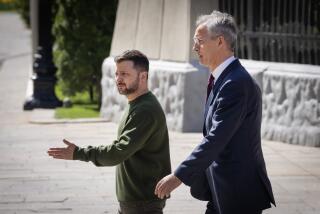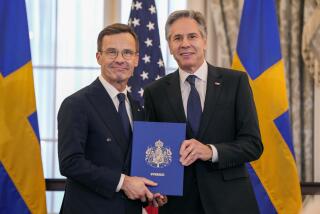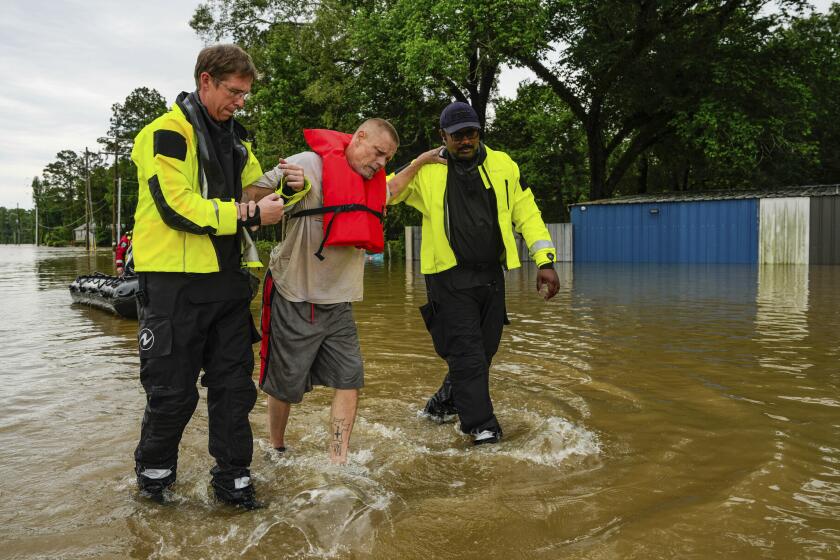NATO Satisfied With Serbian Compliance in Gorazde
Meeting for the first time since they issued a series of ultimatums to Bosnian Serb forces last week to loosen their grip on the Muslim enclave of Gorazde, NATO ambassadors here Wednesday pronounced themselves basically satisfied with the rebels’ response.
“There is general compliance with the deadline set by the alliance . . . for the removal of Bosnian Serb heavy weapons from a 20-kilometer (12-mile) exclusion zone around Gorazde” in Bosnia-Herzegovina, said an official for the 16-member North Atlantic Treaty Organization. “This development gives hope for the future.”
The ambassadors convened at NATO headquarters Wednesday morning about eight hours after the expiration of the second of two alliance deadlines that were contained in an ultimatum issued to Bosnian Serb forces last Friday under the threat of air strikes.
The first deadline, which expired Sunday morning, required Serbian forces to withdraw to a distance of at least 1.9 miles from the city center. The second deadline, which came Wednesday morning, demanded that the Bosnian Serbs withdraw to a distance of 12 miles.
A NATO official said the ambassadors’ assessment was based on information gathered by U.N. forces in Bosnia and by NATO’s Southern Command, which is based in Naples, Italy, and responsible for alliance military operations in the region.
The agreement between NATO and the United Nations on the extent of Bosnian compliance with the ultimatum stood in sharp contrast to major differences between the two that surfaced Saturday when the United Nations first delayed and then refused a NATO request to launch air strikes against Bosnian Serb guns that had continued to pound Gorazde in defiance of alliance demands.
Meantime, Secretary of State Warren Christopher said Wednesday that a newly formed group on the Balkans--which brings together the United States, the United Nations, the European Union and Russia--could meet at the foreign minister level in Geneva as early as next week to discuss steps to achieve a permanent cease-fire and a political settlement in Bosnia.
At a news conference in Riyadh, Saudi Arabia, Christopher said group representatives were exploring options for peace and are scheduled to begin talks today in the Bosnian capital, Sarajevo.
“This is a particular moment when we may have an opportunity to make some real progress against the background of the apparent success of the NATO ultimatum in Gorazde,” he said.
In Gorazde on Wednesday, the Associated Press reported that aid workers were struggling to restore a semblance of normal life to the battered city. The three-week Serbian pounding of the enclave destroyed its water plant, wrecked its hospital and stranded thousands of hungry refugees whose villages were destroyed.
“Where to accommodate 12,000 people is the key question in Gorazde these days,” Fahrudin Becic, a ham radio operator, said in a broadcast monitored in Sarajevo.
Gorazde is the center of a 130-square-mile U.N.-declared haven holding about 65,000 people. A worker in Gorazde for the U.N. Children’s Fund estimated that 35,000 to 50,000 people are in the city, up to half of them refugees.
Becic and another local ham radio operator, Enes Musovic, disputed U.N. contentions that Serbs had all but left the exclusion zone, the AP said. Musovic said Serbian forces shelled the village of Osanica, seven miles southwest of central Gorazde, on Wednesday.
At the United Nations on Wednesday, the Security Council approved the deployment of 6,550 more peacekeeping troops to protect the U.N.-designated safe areas in Bosnia after the United States dropped objections to an expanded force.
Marshall reported from Brussels and Wright from Riyadh.
More to Read
Start your day right
Sign up for Essential California for news, features and recommendations from the L.A. Times and beyond in your inbox six days a week.
You may occasionally receive promotional content from the Los Angeles Times.






